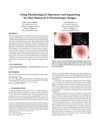 31 citations,
September 2008 in “International Journal of Andrology”
31 citations,
September 2008 in “International Journal of Andrology” 5-alpha-reductase inhibitors may cause a low incidence of erectile dysfunction that decreases over time.
 31 citations,
January 2003 in “Dermatology”
31 citations,
January 2003 in “Dermatology” Steroidogenic isoenzymes may help improve treatments for common hair loss.
 30 citations,
July 2019 in “Endocrinology”
30 citations,
July 2019 in “Endocrinology” Certain HSD3B1 gene types are linked to worse prostate cancer outcomes and affect treatment response and other health conditions.
 28 citations,
May 1986 in “Clinics in endocrinology and metabolism”
28 citations,
May 1986 in “Clinics in endocrinology and metabolism” New compounds may soon be tested to treat excessive hair growth in women.
 27 citations,
January 2001 in “Endocrine Practice”
27 citations,
January 2001 in “Endocrine Practice” Finasteride cream reduces hair growth in women with hirsutism, but more research needed.
 20 citations,
April 2011 in “British Journal of Dermatology”
20 citations,
April 2011 in “British Journal of Dermatology” Reflectance confocal microscopy can tell apart white dots on the scalp as either sweat gland ducts or hair follicle openings.
 18 citations,
December 2010 in “Journal of Trace Elements in Medicine and Biology”
18 citations,
December 2010 in “Journal of Trace Elements in Medicine and Biology” Women with AGA have more androstenedione and dihydrotestosterone, less copper and zinc; copper imbalance affects AGA; treatment improves hormones and minerals.
 17 citations,
June 2012 in “Australasian Journal of Dermatology”
17 citations,
June 2012 in “Australasian Journal of Dermatology” Finasteride and low-dose dutasteride combo improves hair growth and reduces hair loss with no major side effects.
 14 citations,
November 2008 in “Expert opinion on drug metabolism & toxicology”
14 citations,
November 2008 in “Expert opinion on drug metabolism & toxicology” Finasteride helps treat prostate issues and may prevent prostate cancer in high-risk men.
 13 citations,
January 2019 in “Endocrine journal”
13 citations,
January 2019 in “Endocrine journal” Dihydrotestosterone treatment can help penis growth in boys with 5α-reductase deficiency but doesn't fully normalize size after puberty.
 13 citations,
December 2017 in “BMC Complementary and Alternative Medicine”
13 citations,
December 2017 in “BMC Complementary and Alternative Medicine” The Asian herbal mix with Houttuynia cordata, Perilla frutescens, and green tea helped grow hair in mice.
 12 citations,
October 2013 in “The Prostate”
12 citations,
October 2013 in “The Prostate” Dutasteride and finasteride affect different cell types differently.
 12 citations,
May 2010 in “PubMed”
12 citations,
May 2010 in “PubMed” No definitive link between finasteride and male breast cancer, but further research is needed.
 12 citations,
January 1998 in “Endocrine journal”
12 citations,
January 1998 in “Endocrine journal” Saw palmetto extract can block the enzyme that converts testosterone in pig prostate cells.
 12 citations,
January 1984 in “Anesthesia & Analgesia”
12 citations,
January 1984 in “Anesthesia & Analgesia” Anesthesia and surgery can cause temporary hair loss, but hair usually grows back without treatment.
 11 citations,
February 2019 in “Journal of Cosmetic Dermatology”
11 citations,
February 2019 in “Journal of Cosmetic Dermatology” Low zinc and biotin levels linked to male hair loss; supplements may help.
 11 citations,
January 2018 in “Asian Journal of Andrology”
11 citations,
January 2018 in “Asian Journal of Andrology” Dutasteride caused more penile tissue changes than finasteride, possibly increasing erectile dysfunction risk.

The new algorithm removes hair from skin images better than previous methods, helping diagnose melanoma.
 11 citations,
January 2000 in “The Journal of Steroid Biochemistry and Molecular Biology”
11 citations,
January 2000 in “The Journal of Steroid Biochemistry and Molecular Biology” LY320236 is a strong blocker of two enzymes that change testosterone into dihydrotestosterone and might help treat conditions related to male hormones.
 10 citations,
December 1995 in “Journal of women's health”
10 citations,
December 1995 in “Journal of women's health” Finasteride reduces hair growth in women with hirsutism and works better with electrolysis.
 10 citations,
October 1992 in “Hormone and Metabolic Research”
10 citations,
October 1992 in “Hormone and Metabolic Research” Finasteride safely lowers DHT levels without affecting hormone levels, helping with conditions like enlarged prostate, acne, and hair loss.
 8 citations,
February 2009 in “Current Women's Health Reviews”
8 citations,
February 2009 in “Current Women's Health Reviews” Testosterone treatment can improve sexual function and bone density in women but may have adverse effects and requires more research on safety and guidelines.
 8 citations,
January 1991 in “European Urology”
8 citations,
January 1991 in “European Urology” Finasteride lowers DHT levels and raises testosterone in a dose-dependent way.
 7 citations,
April 2020 in “Dermatologic Therapy”
7 citations,
April 2020 in “Dermatologic Therapy” Dexpanthenol improves hair growth in male baldness.
 7 citations,
March 2020 in “Lasers in Medical Science”
7 citations,
March 2020 in “Lasers in Medical Science” LLLT is a safe, promising hair loss treatment, but more research needed.
 7 citations,
July 2019 in “Scientific Reports”
7 citations,
July 2019 in “Scientific Reports” Finasteride helps reduce heart enlargement in heart failure patients.
 7 citations,
October 2018 in “BMC genomics”
7 citations,
October 2018 in “BMC genomics” Key genes can rewire networks, changing skin appendage types.
 7 citations,
June 2015 in “JAMA Dermatology”
7 citations,
June 2015 in “JAMA Dermatology” Finasteride's potential harms are hard to accurately measure.
 6 citations,
June 2019 in “Skin Research and Technology”
6 citations,
June 2019 in “Skin Research and Technology” Finasteride works for hair loss by maintaining existing hair follicles, not reversing miniaturization.
 3 citations,
March 2019 in “Post Reproductive Health”
3 citations,
March 2019 in “Post Reproductive Health” Testosterone replacement can help menopausal women with various symptoms, but should be used carefully and is not yet officially licensed in the UK for women.






























